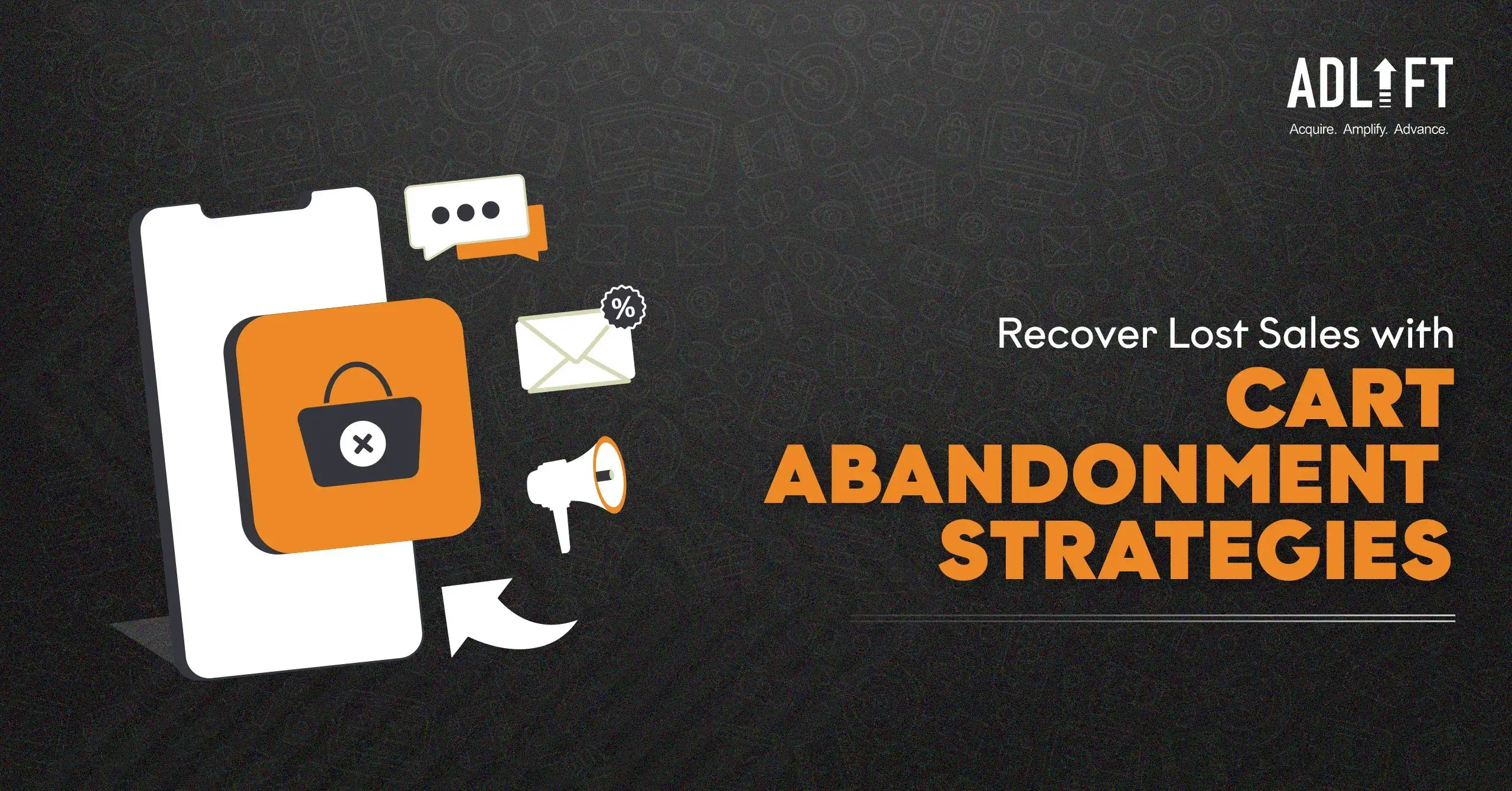Tackling Cart Abandonment: Strategies for Recovering Lost Sales

You’re seeing a lot of window shopping, but no one’s buying! This means customers are adding items to their carts but not completing the purchase. In other words, your business is facing cart abandonment.
This is a pretty familiar phenomenon in the e-commerce world. The global average shopping cart abandonment rate is 73.12%. This means for every 100 people who reach the cart, around 70 don’t buy anything. Sounds serious, doesn’t it?
However, tackling this issue is also easy. All you need is the right strategy.
Whether you are worried about Shopify abandoned cart or WooCommerce abandoned cart, we have jotted down strategies for your lost sales. Make sure to read it till the end.
Reasons for Shopping Cart Abandonment
Before we go to strategies, it’s important to learn the reasons why it happens:
- Unexpected Costs
Extra costs like shipping fees, taxes, or handling charges that are revealed during the final checkout process can surprise and make customers abandon the cart. - Complicated Checkout Process
Lengthy or confusing checkout processes can frustrate customers, especially if they have to create an account or provide unnecessary information. - Technical Issues
Glitches, slow loading times, or website errors can also disrupt the checkout process, leading customers to abandon their carts out of frustration. - Security Concerns
Customers may hesitate to provide sensitive information like credit card details if they don’t trust the website’s security measures. - Comparison Shopping
Customers might use the shopping cart as a way to compare prices or products from different websites before making a final decision. - Lack of Payment Options
Limited payment options can also be a barrier for some customers who prefer alternative methods like PayPal, Apple Pay, or other digital wallets. - Unsatisfactory Return Policy
Unclear or unfavorable return policies may make customers hesitant to complete their purchase, especially if they’re unsure about the product. - Distractions
External factors such as receiving a phone call, losing an internet connection, or being interrupted can also cause this issue. - Limited Shipping Options
Long delivery times or the absence of express shipping options may discourage customers from completing their purchases, especially if they need the items urgently. - Lack of Trust
Poor product reviews, absence of customer testimonials, or unfamiliarity with the brand can also reduce trust and lead to cart abandonment. - Mobile Optimization Issues
Websites that are not optimized for smartphones may provide a poor user experience, causing customers to abandon their carts. - Out-of-Stock Items
If a customer discovers that an item in their cart is out of stock during their checkout, they may abandon their cart.
10 Strategies to Tackle Cart Abandonment Issues
Every reason for cart abandonment needs a different strategy. Below, we have tried to offer a solution to them all. Read and use the strategy that suits your situation:
- Streamline Checkout Process:
If you think a difficult and long checkout process is the culprit, just simplify it. You can implement guest checkout options to allow customers to buy without creating an account. - Transparent Pricing
Many hotel booking companies do this. They display all costs upfront, including taxes, to avoid surprising customers during checkout. If your costs are a bit high, consider offering free shipping on larger orders to incentivize purchases. - Optimize Website Performance
Always ensure your website is fast-loading and free of technical glitches. For this, have a team that regularly monitor and test your website for any issues that may disrupt the shopping experience. - Enhance Security Measures
This is a non-negotiable strategy, no matter your shopping cart abandonment rate. Invest in robust security measures to safeguard customer data and build trust. You can also display trust badges and security certifications, such as PCI DSS complaints, to reassure customers about the safety of their information. - Offer Multiple Payment Options
Gone are the days when COD or Debit cards were the major payment options. Now, you need to provide a variety of payment methods to accommodate different customer preferences. - Transparent Return Policy
Communicate your return policy to customers to avoid any concerns they may have about purchasing. As for a complete transaction, make the return process easy and hassle-free. - Implement Exit-Intent Pop-ups
Use exit-intent pop-ups to offer discounts or incentives to customers who are about to abandon their carts. This can help recapture their interest and encourage them to complete their purchase. - Optimize for Mobile Devices
A larger number of people use mobiles for shopping. So, make sure your website is fully optimized to provide a seamless shopping experience across all platforms. - Personalized Remarketing
This one’s a bit targeted. You can implement personalized remarketing campaigns to re-engage customers who have abandoned their carts. For this, you can send targeted emails or display retargeting ads with tailored messaging and offers to encourage them to return and complete their purchase. - Monitor and Analyze Metrics
Regularly monitor and analyze cart abandonment metrics to identify trends and pinpoint areas for improvement. Use state-of-the-art tools like Google Analytics to track user behavior and identify any bottlenecks in the checkout process. - Bonus: Add An exit-intent Pop-up
This is a website overlay that “pops up” when the customer tries to leave the cart. It usually has an offer or discount code to convince the customer to close the deal. You can display customized messages based on the type of user or the webpage they are on.
Get Your Cart Ready!
Small or big – every shopping cart abandonment issue is solvable. You just need to adopt the right strategy. If you are still confused and don’t know what to do, feel free to contact us.
Here at AdLift, we have a team of experts who can handle your abandoned cart and make sure your sales don’t get lost.
FAQs
Cart abandonment occurs when visitors add products to their cart but leave the website before making the purchase. It is a common challenge for e-commerce businesses and can be caused by factors like unexpected costs, complicated checkout processes, and security concerns.
Yes, you can. Go to Shopify admin and then to Analytics > Dashboard. Use the Dates section to get data and then use the formula:
[(Added to Cart Sessions – Sessions converted) / Added to Cart Sessions] * 100
To implement this strategy, businesses can segment their audience based on behavior, send targeted emails, or display retargeting ads with tailored messaging and offers. It is suggested to work with a reputable digital marketing company to get the best results.
Pop-ups offer discounts or freebies to encourage customers to finish their purchases before leaving the site.
Follow-up frequency should be strategic. Try not to spam while ensuring timely reminders. A series of well-timed follow-up emails or messages over a few days can be effective.
Sources
https://baymard.com/lists/cart-abandonment-rate
https://marketing.dynamicyield.com/benchmarks/cart-abandonment-rate/
Recent Posts
- Optimizing For Google AI Overviews: What Marketers Need To Know November 19, 2024
- Google’s Latest Shake-up: November 2024 Core Update November 13, 2024
- SEO Ranking Explained: Proven Techniques to Enhance Your Website’s Traffic October 22, 2024
- The Importance of Mobile SEO Optimization: A Guide to Staying Competitive October 16, 2024
- What is Evergreen Content? Build Traffic That Never Fades October 15, 2024
- The Role of Technical SEO Elements in Enhancing Site Performance and Rankings October 10, 2024
- Customer Acquisition 101: Building a Loyal Client Base October 10, 2024
- How User Experience Directly Impacts SEO Rankings: Key Factors to Consider October 8, 2024
- Core Web Vitals and SEO: How to Optimize for a Faster Website? October 3, 2024
- What is Schema Markup? Strategies to Use it for Better SEO Performance September 16, 2024
Get
in Touch
Contact AdLift for a 360-degree marketing plan


